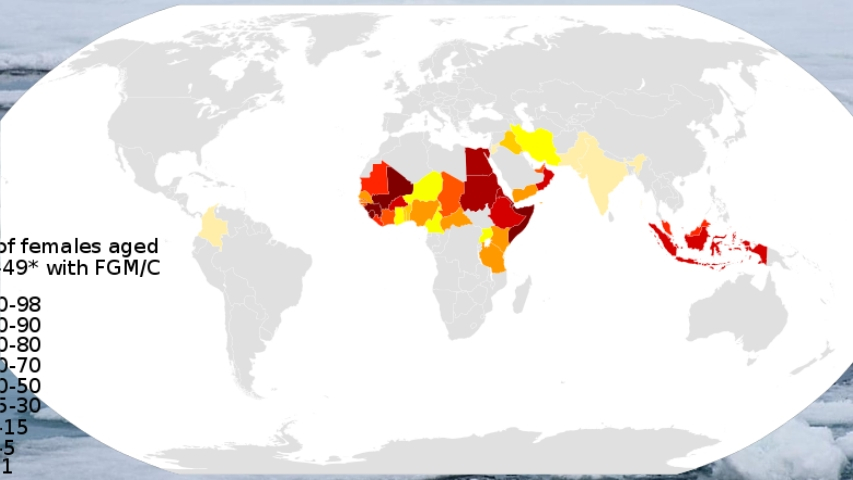
An Entire Sudanese Village comes together to eradicate Female Genital Mutilation
by Shruthi Venkatesh November 27 2018, 1:16 pm Estimated Reading Time: 3 mins, 3 secsFemale genital mutilation (FGM) is a procedure that involves partial or total removal of the external female genitalia, or other injury to the female genital organs for non-medical reasons. The practice is mostly carried out by traditional circumcisers, who often play other central roles in communities, such as attending childbirths. In most places, health care providers perform FGM due to the erroneous belief that the procedure is safer when treated. The World Health Organisation strongly urges health professionals not to perform such procedures.

A composite data map showing the percentage of women and girls aged 15-49 years (unless otherwise stated) who have undergone FGM. Source - UNICEF (2016)
FGM is a serious health problem in Sudan. This procedure is harmful to women and causes many complications during pregnancy and childbirth. According to a survey carried out by Sudan in 2014, total number of 21,947 women were included out of the 6,249 (28.5 %) from urban and 15,698 (71.5%) from rural areas. The prevalence of female circumcision was 89%. Women who had circumcised daughters were 32.1 %. The highest prevalence of FGM was reported from South Kordofan state with 7.8% and lowest was in Red Sea state 7.6%.
There are five types of female genital mutilation in Africa namely Mild Sunna which include the pricking of the prepuce of the clitoris with a sharp instrument. The second is called Modified Sunna in which partial or total removal of the clitoris is applied. Furthermore, the third type is called Clitoridectomy/Excision in which the removal of all or part of the clitoris is performed plus a partial or all removal of the Labia minor. Moreover, the Infibulations or Pharaonic circumcision includes clitoridectomy, excision of Labia minor and the inner wall of the Labia major. The fifth type is Introcision where enlargement of the vaginal orifice with a sharp instrument is practised. In short, it is a brutal one which could happen in a women’s life.
Now, an entire village in Sudan has eradicated female genital mutilation. Sudan's government, with help from international aid, is hoping to put an end to FGM nationwide, by 2030. This comes as great news in honour of the International Day for the Elimination of Violence against Women. The campaign was initiated by the UN, to eradicate violence against women. Sudan’s mighty step is one of the great honours to the campaign itself.
The best part is that the UK is all set to give £50m ($64m) in aid money to help stop female genital mutilation (FGM) in Africa. The aid package will help fund organisations such as the Saleema project in Sudan, which aims to show girls they can feel empowered if they are left uncut as well as trying to shift the attitudes of older members in the community. Ministers have said the money will also have a beneficial effect in the UK as it will be used to help reduce the risk of girls being taken abroad to be cut.
Announcing the aid money, International Development Secretary Penny Mordaunt said FGM could not be eliminated in the UK ‘without ending it globally’. “Inspirational, courageous African women are leading efforts to end the practice in their own countries, and thanks to them, more communities are starting to abandon the practice,” she said. “But progress is at a critical juncture and we must work to protect the millions of girls that are still at risk of being cut.”
Anne Quesney, ActionAid's senior women's rights advocacy adviser further added, “However, focusing on FGM alone is not enough... If we seriously want to eliminate violence against women and girls, we urgently need a holistic, well-resourced approach to tackling gender inequality more widely.”




-173X130.jpg)
-173X130.jpg)
-173X130.jpg)
-173X130.jpg)
-173X130.jpg)
-173X130.jpg)
-173X130.jpg)
-173X130.jpg)